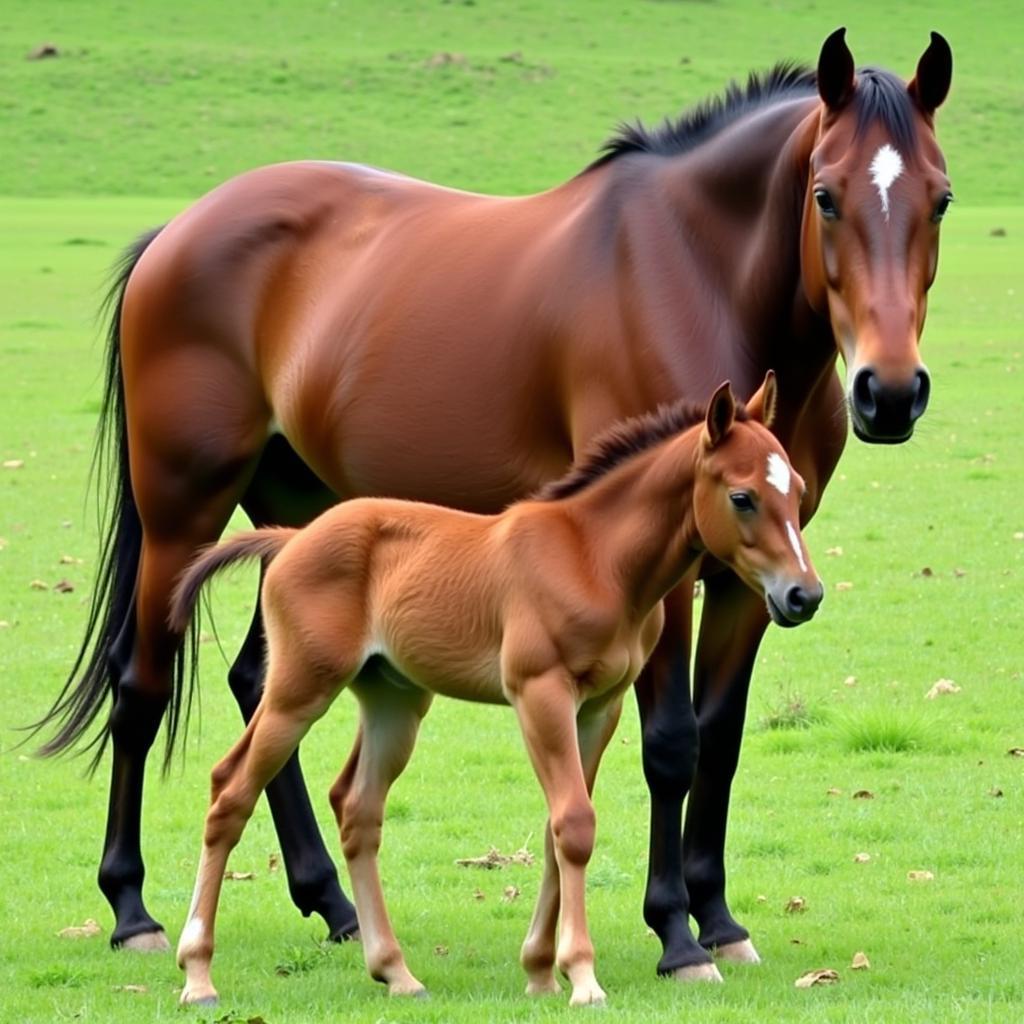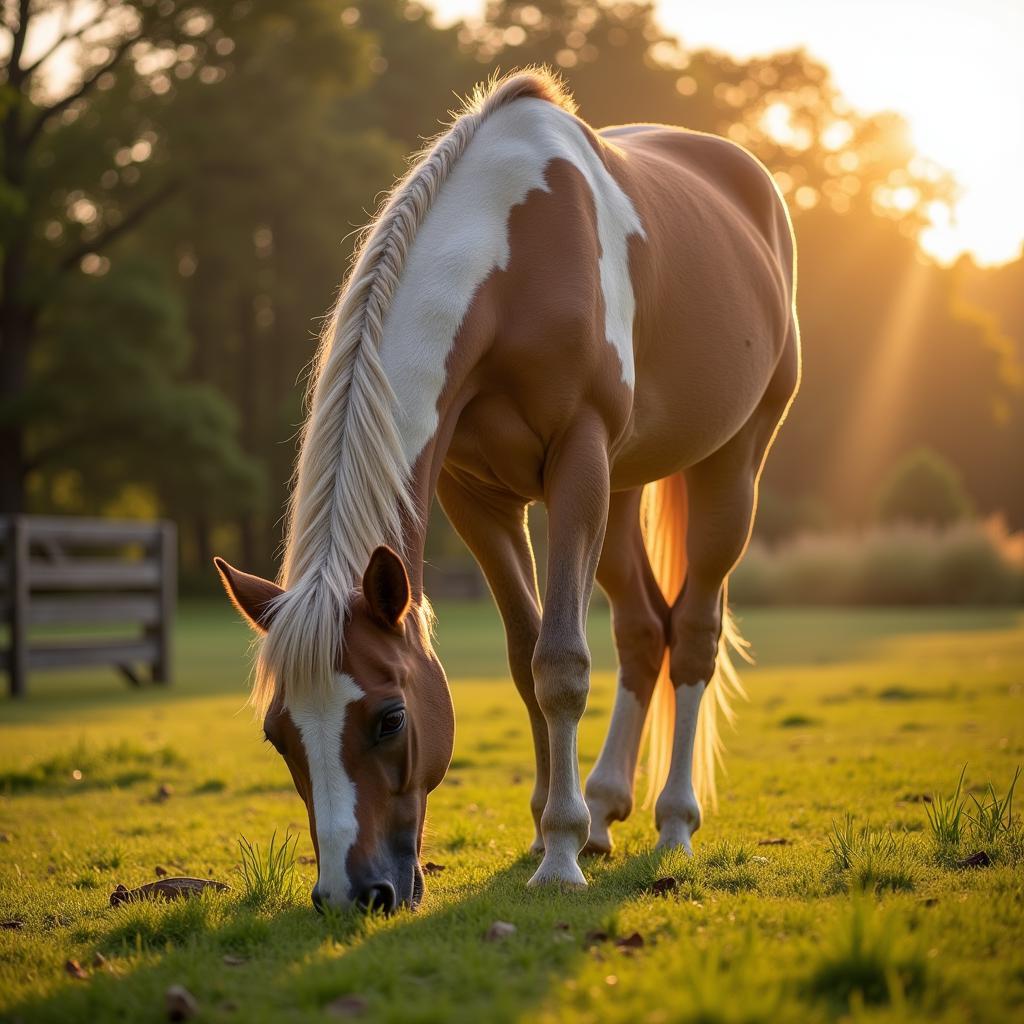Understanding Horse Life Stages is essential for any horse owner or enthusiast. From birth to their twilight years, horses go through distinct developmental periods, each with its own specific needs and considerations. Knowing these stages helps us provide the best possible care, training, and overall well-being for our equine companions.
From Foal to Weanling: The Early Stages of Horse Life
The first few months of a horse’s life are a period of rapid growth and development. A newborn foal, still wobbly on its legs, quickly learns to navigate its surroundings and bond with its mother. Proper nutrition is vital during this stage, with the mare’s milk providing essential antibodies and nutrients. As the foal grows, it begins to nibble on grass and hay, gradually transitioning to solid food. By six months of age, the foal is typically weaned from its mother, marking the end of the foal stage and the beginning of the weanling stage. This transition can be stressful for both mare and foal, requiring careful management to ensure a smooth process.
 Foal Nursing Mare
Foal Nursing Mare
Yearling to Young Adult: Horse Life Stages of Adolescence
The yearling stage, from one to two years old, is characterized by continued growth and the development of coordination and balance. During this time, young horses begin to explore their social interactions with other horses, learning valuable herd dynamics. Training can begin in the yearling stage, focusing on basic groundwork and handling to build a strong foundation for future ridden work. As the horse matures into a young adult, typically between two and five years old, its physical and mental capabilities continue to develop. This is a crucial period for training, as the horse learns more complex skills and develops its athletic potential.
Prime Time: The Adult Horse Life Stage
From five to ten years old, horses generally reach their physical peak, entering their prime. They are typically strong, agile, and capable of performing at their highest level. This is the ideal time for competitive riding and other demanding activities. Maintaining proper nutrition, exercise, and veterinary care is crucial during this stage to ensure the horse remains healthy and sound. Understanding the individual horse’s temperament and personality also plays a significant role in maximizing its potential.
Common Questions about Adult Horse Care
What are the nutritional needs of an adult horse in its prime? A balanced diet of hay, grain, and supplements, tailored to the horse’s specific workload and metabolic needs, is essential.
How much exercise does an adult horse need? The amount of exercise varies depending on the individual horse and its discipline, but regular turnout and ridden work are crucial for maintaining physical and mental well-being.
What are common health issues to watch out for in adult horses? Conditions such as lameness, colic, and respiratory problems can occur in adult horses. Regular veterinary check-ups and preventative care are vital for early detection and treatment.
Senior Horses: The Golden Years
As horses age, they enter their senior years, typically from fifteen years and beyond. While their physical capabilities may decline, they can still enjoy a fulfilling life with appropriate care and management. Senior horses often require adjustments to their diet, exercise routine, and overall management to address age-related changes. Regular veterinary check-ups become even more important to monitor for age-related health issues and provide necessary care. Providing a comfortable and enriching environment is key to ensuring a happy and healthy life for senior horses.
 Senior Horse Grazing Peacefully
Senior Horse Grazing Peacefully
Conclusion: A Lifelong Journey Through Horse Life Stages
Understanding the various horse life stages is essential for providing the best possible care for our equine companions. From the playful energy of foals to the wisdom of senior horses, each stage presents unique opportunities and challenges. By recognizing the specific needs and characteristics of each stage, we can nurture our horses’ physical and mental well-being, fostering a strong bond and enjoying a rewarding partnership throughout their lives. Remember to consult with your veterinarian for personalized advice on caring for your horse at each life stage.
FAQs about Horse Life Stages
-
What is the average lifespan of a horse? Horses typically live between 25 and 30 years, although some may live longer.
-
At what age can a horse be ridden? While some horses may be started under saddle as young as two or three years old, it’s generally recommended to wait until they are physically and mentally mature, typically around four or five years old.
-
How do I know if my horse is a senior? Besides age, signs of aging include graying hair, decreased muscle mass, and potential changes in behavior and activity levels.
-
What are some common health problems in senior horses? Arthritis, dental issues, and metabolic disorders are common concerns in older horses.
-
How can I enrich the life of a senior horse? Providing companionship, comfortable bedding, and opportunities for gentle exercise and social interaction can greatly enhance the well-being of a senior horse.
-
What are the key nutritional considerations for a foal? The mare’s milk is crucial for the first few months, followed by a gradual introduction to solid food like hay and grain.
-
How do I choose the right feed for my yearling horse? Consult with your veterinarian to determine the appropriate feed based on the horse’s breed, growth rate, and activity level.
Need more help? Check out our other articles on horse care and training. For personalized support, contact us at Phone Number: 0902476650, Email: [email protected] or visit our address: 139 Đ. Võ Văn Kiệt, Hoà Long, Bà Rịa, Bà Rịa – Vũng Tàu, Việt Nam. We have a 24/7 customer support team.





